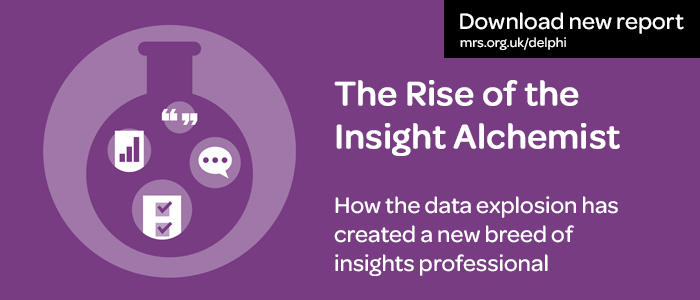Blended skills and data agnosticism is the ‘future of insight’

The panel discussed the findings from a recent MRS report called The Rise of the Insight Alchemist, which explored how traditional research, like surveys and interviews, is being blended with behavioural data from social media, sales and other customer engagement platforms.
Having described himself as “not a traditional market researcher”, Alex Owens, vice-president, people data centres, CMI, at Unilever, opened the conversation with a provocation: “Unfortunately at times, some market research professionals forget the need to understand the business model. An insight can only be an insight if its operationally feasible and financially viable.”
Owens went on to say that no one data source can provide an answer to a business question, and researchers need to “understand the role that data can play in solving business problems, but also be equally aware that data alone is not going to give you the answer”.
Dr Parves Khan, vice-president, market research and insight at Into University Partnerships, went on to define an insight alchemist as an expert who can bring together multiple sources of data and layer it with “qualitative judgement based on their experience, to create a compelling narrative, wrapping that understanding into commercially framed options and recommendations that drive growth”.
“If you haven’t got that person in your organisation you're going to need them,” she said.
To illustrate the danger of looking at behavioural data in isolation, Khan gave the example of her buying online gaming products for her teenage son using her own credit card to negate privacy and security risks on his behalf. “A lot of middle-aged women were doing the same – so we have a new demographic who look like they want to get into gaming – but maybe they are simply buying for other people,” she said.
The group discussed a key finding in the report that market research professionals were making the trade-off between their traditional focus on precision and robust insights in favour of ‘good enough’ insight, delivered at speed and lower cost.
“It depends on the use case of that data,” said Khan. “If you’re putting together a business case for a million dollar investment in a big marketing campaign you probably do want some precise data points to have the confidence to do that. But often you just want good enough data for your everyday tactical decision making; a snapshot of your customer and directional data for market trends.”
If, said Khan, researchers prioritises accuracy over speed, the risk is that research can “stifle innovation if we have to wait until we have all the facts.”
Belinda Djamson, managing director for data management and ethics at Accenture, sounded a note of caution. She said that the increase in take up of data-driven solutions in client organisations is coupled with a desire to use data ethically, in addition to complying with regulatory frameworks, for example the General Data Protection Regulation (GDPR).
“The concept of making artificial intelligence (AI) transparent, doing it responsibly, is becoming top of mind for clients. If we focus on doing the right thing when we’re collecting information, we can embed [ethics] in the same automation processes,” Djamson said.
On the subject of automated solutions, Owens felt the emphasis should be on augmented intelligence – ie, guided by humans – rather than artificial or machine driven. “All data is biased and no data in isolation is precise,” he said. “However automated it is, you’ll need the human eyes – augmented data.” Owens concurred with the report where it stressed that all professionals working in customer insight need to understand the limitations of various data sources.
Asked whether senior leadership had a preference for hard data over what is sometimes perceived as more ‘touchy feely’ methodologies like focus groups, Khan wasn’t convinced that all senior decision-makers had moved on.
“Even five years ago when I worked for a big insurance company people talked about ‘hard data’ and ‘soft data’ – the perception was that hard data was objective, with greater veracity to it and is non-biased, versus people’s opinions from focus groups,” said Khan. “I’d like to think we’ve moved on from that and that we now appreciate there are strengths and limitations to all sorts of data and one is not superior to the other. But I’m not too sure the c-suite get it yet.”
The session ended with each panellist choosing their top recommendation for smaller organisations that are struggling to meet the challenge of blended data and insight due to internal silos, skills gaps and lack of budget and technology.
Khan said companies should explore the free data that is available from open sources.
Djamson said the focus should be on company culture: “Introduce the concept of data literacy into your organisation – let everyone understand the usefulness of data.”
“I wouldn’t start with the data, but with the questions you need to answer through the data,” said Owens. “What is the business trying to answer? Focus the mind on the types of data you might need and the types of people you might need to do something with the data.”

We hope you enjoyed this article.
Research Live is published by MRS.
The Market Research Society (MRS) exists to promote and protect the research sector, showcasing how research delivers impact for businesses and government.
Members of MRS enjoy many benefits including tailoured policy guidance, discounts on training and conferences, and access to member-only content.
For example, there's an archive of winning case studies from over a decade of MRS Awards.
Find out more about the benefits of joining MRS here.














1 Comment
Andrew Watts
4 years ago
Very interesting discussion. At KHWS, we think it's fundamental that you identify the unconscious buying behaviour that has led to sales and media attribution data. Only be understanding the unconscious cues that drive purchase, can you really identify the insights that will lead to more effective messaging and marketing.
Like Reply Report